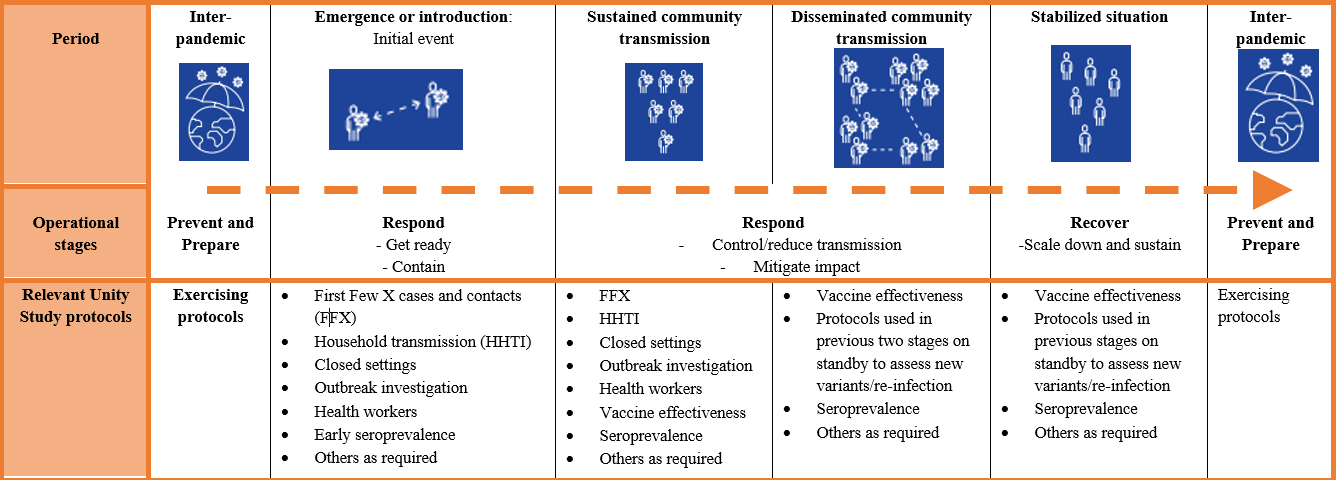- Home/
- Initiatives/
- Respiratory Investigations and Studies (Unity Studies)

The Investigations & Studies Global Initiative, also known as the Unity Studies, provides a pandemic preparedness and readiness framework for conducting targeted investigations and studies that are critical to the risk assessment of any emerging or re-emerging respiratory pathogens of pandemic and epidemic potential.

The Unity Studies are critical tools to supplement routine surveillance to address specific questions, particularly in the early stages of a pandemic, but also over time through a continuous, periodic, or alert-driven (e.g., emergence of a subtype, variant or lineage of public health significance) assessment process. These investigations and studies are intended to be used to rapidly assess transmissibility, estimate population susceptibility and/or immunity and infection/disease severity, support identification of risk groups or population groups in need to target interventions, and assess effectiveness of interventions (e.g. vaccine effectiveness). In addition, Unity Studies support forecasting of the course of a pandemic and inform on the optimal Public Health and Social Measures and allocation medical countermeasures.
The Unity Studies enable countries, regardless of their resource setting, to conduct local, country-owned, investigations and are thus an invaluable tool for research equity. For more information on the initiative and lessons learned during the COVID-19 pandemic, please see:- A framework for seroepidemiologic investigations in future pandemics: insights from an evaluation of WHO’s Unity Studies initiative. http://doi.org/10.1186/s12961-023-00973-z
- Early epidemiological investigations: World Health Organization UNITY protocols provide a standardized and timely international investigation framework during the COVID-19 pandemic. https://doi.org/10.1111/irv.12915
- Learning from serosurveillance for SARS-CoV-2 to inform pandemic preparedness and response https://doi.org/10.1016/S0140-6736(23)00964-9
Definition of terms: Investigations (outbreak investigations or others) and studies focus on specific objectives not efficiently met by other existing surveillance systems. Their goal is to act as specialized instruments to supplement ongoing surveillance by filling the gaps in our understanding about the descriptive and analytic epidemiology of a circulating pathogen, and the specific measures that may be optimally applied to reduce associated illness or impact). Source: WHO Mosaic surveillance framework |
Vision
Unity Studies Network Sites
The global network of Unity Studies Network Sites ensures response readiness for rapid evaluation of any novel respiratory viruses of pandemic potential and respiratory transmitted pathogens (for example influenza, coronaviruses etc). Chosen sites are primed to conduct country-specific standardized, pre-planned and pre-approved investigations using the Unity Studies template protocols.
Governance
Unity Studies Network Sites will be governed by the terms of reference (ToR) provided below. The ToR provides a description of the duties of the Network Sites, criteria for site selection and a description of the benefits of participating in the network. It also details how interested institutions/entities can join this global effort.
- Terms of Reference for Unity Studies Network Sites LINK
Standardized templates
A series of standardized templates of protocols have been developed for influenza-specific investigations and for investigating the emergence of other respiratory viruses of pandemic potential. The figure below demonstrates the burden pyramid for influenza infections, how the Unity Studies may be used in different contexts, and some of the epidemiological parameters that may be assessed using the protocols. The table highlights at which stages of a pandemic the protocols may be implemented according to the organizing framework for respiratory pathogen pandemic preparedness and response (PRET).
Access pan-respiratory templates protocols
- The First Few X cases and contacts (FFX) investigation template protocol for pandemic respiratory pathogens or diseases X (Link soon available).
- Household transmission investigation template protocol for pandemic respiratory pathogens X or diseases X (Link soon available).
- Closed settings transmission investigation template protocol for pandemic respiratory pathogens or diseases X (Link soon available).
- Protocol to investigate outbreak of non-seasonal influenza and other emerging acute respiratory disease LINK.
- (More under development, ex. Seroprevalence, health workers, vaccine effectiveness)
Access pathogen-specific webpages and contents here:
Figure: Disease pyramid of a given respiratory infection, the Unity Studies protocols and associated epidemiological parameters
(Click on image to enlarge and download)

Table: Unity Studies protocols aligned with the pandemic periods of the organizing framework for respiratory pathogen pandemic planning, Preparedness and Resilience for Emerging Threats (PRET).
(Click on image to enlarge and download)
Partners collaboration
- Centers for Disease Control and Prevention, United States of America (US CDC)
- Consortium for the standardization of influenza seroepidemiology (CONSISE)
- Epiconcept
- Global Research Collaboration for Infectious Disease Preparedness (GloPID-R )
- International Pasteur Institute Network
- McGill University, Canada
- Robert Koch Institute
- SeroTracker
- University of Melbourne, Australia
Supporting frameworks and strategy
Communication materials
- Brochure (link soon available)
- Video (link soon available)
Supporting toolkit items
- Statistical analysis plan for First Few X cases and contact investigations, Household Transmission investigations and Closed settings investigations protocol (link soon available).
- Design, reporting and critical appraisal tool of household transmission investigation LINK.
- Reporting of Seroepidemiologic Studies for influenza (ROSES-I statement by CONSISE) LINK.
- Ethical considerations toolkit (link coming soon).

